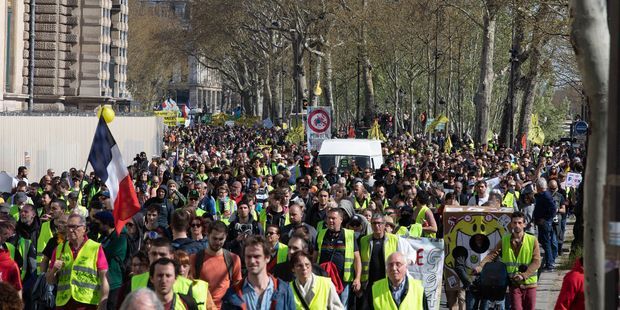France has been convulsed in recent months with some of the worst civil unrest since the student uprisings of 1968. Thousands of ‘Gilet Jaune’ or Yellow Vest protestors have taken to the streets not just in Paris but in a number of other towns and cities across the nation. Some of these protests have been extremely violent with violence coming from both sides of the conflict, from the protestors themselves and from the French security forces. There have been a number of serious injuries caused to protestors by security force violence and the protestors have according to various reports been engaged in quite a few acts of violence themselves including arson and looting.
For at least 21 weeks various French cities have seen Gilet Jaune protests erupt in them. Some of these protests have been huge and some of them much smaller. The protests started because of excessive and punitive taxes on fuel and the exploitation of drivers as a cash cow by draconian fines for speeding. These fines have been seen as less to do with road safety and more to do with the French state squeezing motorists for as much money as possible.
The response of the French Government under President Emmanuel Macron, a pro-European Union centrist, has been at various stages to threaten, cajole, physically attack and offer superficial concessions to the protestors. The French government desperately wants these protests to go away partly because of the disruption caused by them and also because Macron’s government is worried about the effect these protests may have on the upcoming European Parliament elections. Although the EU Parliament is a toothless tiger with no proper legislative powers of its own, the prospect of the French electorate using the election to register a protest at President Macron’s leadership by voting in those opposed to the president’s policies would be a major public relations failure for him.
In an effort to show that his government was listening to people’s concerns about the economy, taxation and other issues, President Macron embarked on a ‘listening project’ with hundreds of public meetings organised by the government taking place. It looks to me as if the government was trying to construct some form of political lightening rod by which public anger at government policies could be discharged. The result of this massive public consultation has been the government considering whether it should back down on at least some of the swingeing taxes that have been imposed on the French population.
While it’s good to see the French government recognising that taxing the citizenry into penury is a bad thing, I wonder whether these tax cut proposals that are being made will be enough to stop the protests? These proposed tax cuts may be too little too late. The Gilet Jaunes protest appears to have morphed into something much more than a tax protest that could be stopped by removal of the offending taxes. The protesters now seem to be on the streets for an amorphous mass of different causes, some leftist, some rightist,some sane and some dodgy. The motivations for the protests are now so wide that any government action to reduce the anger that caused the initial flare up of protest may not be enough to stop them.
The time to buy off the protestors with tax cuts and a reduction in the draconian treatment of drivers was months ago, before the protests picked up other causes. However to have caved into the tax protests at an earlier stage but that would have had the effect of making the French government look weak. As France is beset by economic problems and social cohesion problems brought about in part by inappropriate levels of and types of immigration, weakness is the very last thing that the French government needed to show. President Macron’s government is between a rock and a hard place. The government needed to stop the protests but the action needed to do this may have made it look as if a government that claimed to be strong and dynamic look like it was one that was too easily bullied by mobs which in turn may have caused other mobs with different causes to take to the streets in order to push for the policies that they wanted. Macron’s government could not make concessions too early but now it seems they have left the concessions too late.
The French government may be under the impression that by ameliorating the initial impetus for the protests that they may die down, but that impression may be mistaken. Whilst such concessions may remove some of the protestors, the protests have picked up individuals and groups with other causes that are less directly connected to the taxation issue and are instead more concerned with the way that France is governed.
I have some doubt as to whether the protestors can sustain the current level of protest until the next French presidential and parliamentary elections in 2022 as protesting at this intensity is difficult to keep up for a long time. However I believe that because of the scale of these protests, the way that the French state has confronted them and the fact that the reasons for the protests have broadened, they will have a significant effect on French voting patterns next time around. It will be interesting to see who the French choose to represent them. Will they choose socialism as has happened in the past or will they lurch to the nationalist Right? Whatever happens I think that these protests will have effects, some negative and some positive on the make up of the next French government.





